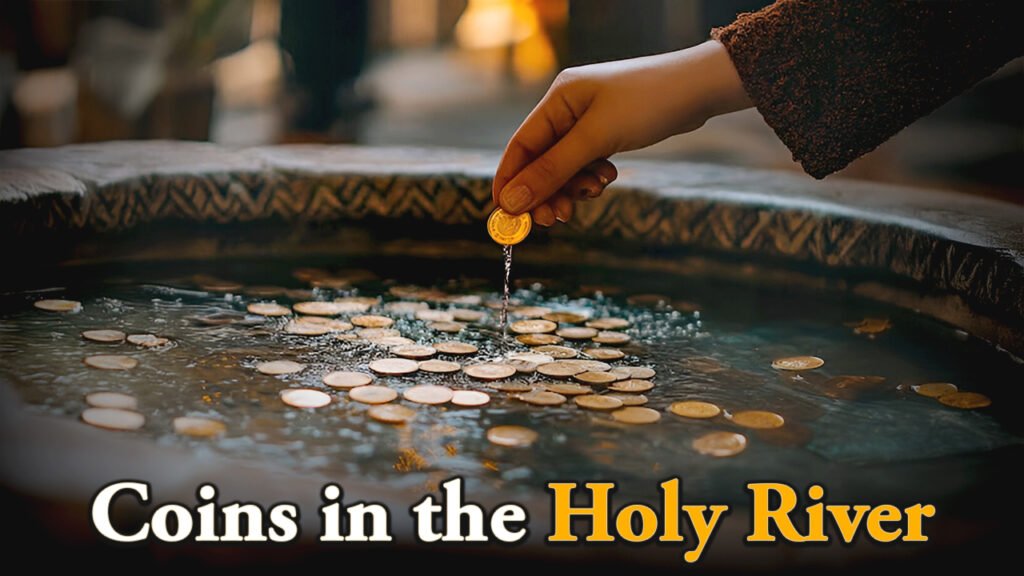Introduction to coins in the holy river
Have you ever found yourself standing at the edge of a holy river, a shiny coin nestled in your palm, ready to make a wish? You’re not alone. The practice of tossing coins in the holy river into sacred waters is a tradition that spans cultures, religions, and centuries. But why do people engage in this curious ritual? Let’s dive deep into the murky waters of this fascinating custom and explore the various reasons behind it.
Historical Origins of Coin Tossing in Rivers
Ancient Beliefs
The act of throwing coins in the holy river into rivers isn’t a modern phenomenon. It’s a practice deeply rooted in ancient beliefs and customs. Our ancestors believed that water bodies were home to powerful deities and spirits. By offering coins, they hoped to appease these supernatural beings and gain their favor.
Cultural Significance
As civilizations evolved, so did the meaning behind this act. In many cultures, rivers came to symbolize the flow of life love itself. Tossing a coin became a way to connect with this life force, to become part of something greater than oneself.
Religious Significance
Hinduism
In Hinduism, rivers like the Ganges are considered sacred. Devotees believe that offering coins in the holy river to these holy waters can cleanse their sins and bring good fortune. It’s not just about the monetary value; it’s a spiritual transaction.
Buddhism
Buddhist traditions also incorporate water offerings, though not always with coins. The act symbolizes generosity and the letting go of material attachments. It’s a physical representation of spiritual principles.
Other Religions
While most prominent in Eastern religions, similar practices can be found in various belief systems worldwide. From wishing wells to fountain tosses, the idea of offering coins in the holy river to water spirits is surprisingly universal.
Psychological Aspects
Wishful Thinking
Let’s face it: we all love a bit of magic in our lives. Throwing a coin and making a wish gives us a sense of hope and possibility. It’s a moment where we allow ourselves to dream, to believe that our desires might just come true.
Sense of Control
In a world full of uncertainties, tossing a coin into a river gives us a small sense of control. We’re taking action, however small, towards our goals and aspirations. It’s a comforting thought, isn’t it?
Environmental Impact
Pollution Concerns
Here’s where things get a bit murky. While the intention behind coin tossing is often pure, the environmental impact can be significant. coins in the holy river can release harmful metals into the water, affecting aquatic life and water quality.
Ecological Effects
It’s not just about pollution. The accumulation of coins in the holy river can alter river beds, affecting the natural habitat of various species. It’s a classic case of good intentions potentially leading to harmful consequences.
Modern Interpretations
Tourism and Economy
In some places, coin tossing has become a tourist attraction. Think of the Trevi Fountain in Rome. These coins in the holy river often end up funding charitable causes, turning a spiritual act into a force for social good.
Superstition vs. Tradition
In our modern, rational world, many view coin tossing as mere superstition. Yet, others defend it as a meaningful tradition that connects us to our cultural roots. It’s a debate that continues to spark interesting discussions.
Alternative Practices
Eco-friendly Options
As awareness grows about the environmental impact, some are seeking alternatives. Biodegradable offerings or virtual coin tosses are gaining popularity among the eco-conscious.
Charitable Donations
Instead of throwing money into rivers, why not donate to organizations that work to protect these water bodies? It’s a way to honor the tradition while making a real-world impact.
Scientific Studies on Coin Tossing
Psychological Research
Psychologists have studied the phenomenon of coin tossing, exploring its effects on mood and belief systems. Some argue it can have positive psychological benefits, providing a sense of closure or hope.
Sociological Perspectives
From a sociological standpoint, coin tossing in holy rivers is a fascinating example of collective behavior and shared beliefs. It’s a window into how societies construct meaning and ritual.
Famous Holy Rivers and Coin Tossing
Ganges River
The Ganges, India’s holiest river, sees millions of coins in the holy river tossed into its waters annually. It’s a prime example of how this practice can reach massive scales.
Yamuna River
Another sacred Indian river, the Yamuna, also receives countless coin offerings. However, it’s also become a symbol of the environmental challenges posed by this practice.
Other Notable Examples
From the Fountain of Trevi to the wishing wells of Europe, coin tossing isn’t limited to rivers. These various locations each have their unique traditions and stories.
Controversial Aspects
Waste of Money
Critics argue that throwing money into rivers is wasteful, especially in regions facing economic challenges. Couldn’t these coins in the holy river be put to better use?
Religious Commercialization
There’s also concern about the commercialization of religious practices. When does a spiritual act become a tourist gimmick? It’s a fine line that many holy sites are grappling with.
Legal and Ethical Considerations
Government Regulations
Some governments have started to regulate coin tossing in holy rivers, citing environmental concerns. It’s a delicate balance between respecting traditions and protecting nature.
Moral Debates
The practice also raises moral questions. Is it right to potentially harm the environment in the name of tradition or personal wishes? There’s no easy answer, but it’s a conversation worth having.
Cultural Variations
East vs. West Practices
While coin tossing is common in many Eastern religions, Western cultures have their own variations. Comparing these practices offers insight into different cultural values and beliefs.
Urban vs. Rural Traditions
The meaning and method of coin tossing can vary significantly between urban and rural areas. In cities, it might be more of a tourist activity, while in rural areas, it often retains deeper spiritual significance.
The Future of Coin Tossing in Holy Rivers
Changing Attitudes
As environmental awareness grows, attitudes towards coin tossing are shifting. Many are questioning the practice, leading to interesting debates about tradition versus conservation.
Potential Alternatives
Looking ahead, we might see new forms of this ancient practice emerge. Virtual reality offerings or eco-friendly substitutes could be the future of this time-honored tradition.
Personal Stories and Experiences
Everyone who’s tossed a coin into a holy river has a story. From life-changing moments to simple acts of hope, these personal narratives add a human touch to the practice, reminding us of its emotional and spiritual significance.
Read Also: Dreams and its astrological significance
Conclusion of coins in the holy river
The act of throwing coins into holy rivers is a complex tapestry of faith, tradition, psychology, and environmental concerns. While it connects us to ancient practices and offers a moment of hope and reflection, it also raises important questions about our impact on the natural world. As we move forward, finding a balance between honoring traditions and protecting our environment will be crucial. Perhaps the real magic lies not in the coin’s splash, but in our ability to adapt and find new ways to express our hopes and beliefs.
For interesting astrology-related videos, subscribe to us on YouTube
FAQs
- Is it legal to throw coins in all holy rivers?Laws vary by location. Some places have banned the practice due to environmental concerns, while others still allow it.
- What happens to the coins thrown into rivers?In some cases, they’re collected and used for charitable purposes. In others, they remain in the river, potentially causing environmental issues.
- Are there eco-friendly alternatives to coin tossing?Yes, some suggest using biodegradable materials or making symbolic gestures instead of throwing physical objects.
- Does coin tossing in rivers really bring good luck?While there’s no scientific evidence, many believe in its spiritual or psychological benefits.
- How can I participate in this tradition responsibly?Consider the environmental impact and local regulations. Look for eco-friendly alternatives or donate to river conservation efforts instead.

